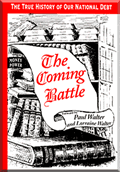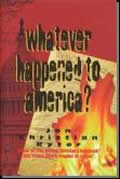AULD
LANG SYNE: 2009 TO 1929
PART 3 of 3
By
Jon Christian Ryter
January 11, 2009
NewsWithViews.com
Middle class investors who had enough liquidity to meet the margin calls on Thursday, Friday and Monday, discovered on Tuesday that they were broke. Their savings were gone. Their homes were gone. Soon their jobs would also be gone. When he wrote "The Great Crash, 1929," John Kenneth Galbraith commented that he believed nobody "...was responsible for the great Wall Street Crash...Nothing could have been more ingeniously designed to maximize the suffering, and also to insure that as few as possible escaped the common misfortune...The man with the smart money, who was safely out of the market when the first crash came, naturally went back in to pick up bargains." (Mariner Books © 1955, pg. 11)
While Galbraith, an establishment journalist, conveniently found no one to blame for the Great Crash of 1929, Congressman Louis McFadden [D-PA], head of the powerful House Banking Committee did. On May 23, 1933 McFadden submitted Articles of Impeachment against the Fed Chairmen into the Congressional Record, charging them with not only deliberately creating the Depression, but with unlawfully and arbitrarily raising and lowering the money supply of the United States to financially benefit private interests. In his tirade against the private interest bankers, McFadden charged "...them with having taken over $80 billion from the United States government in 1928. I charge them...with having arbitrar[il]y and unlawfully raised and diminished the volume of currency in circulation for the benefit of private interests...I charge them...[with]...having conspired to transfer to foreigners and international money lenders title to, and control of, the financial resources of the United States." McFadden argued that the Great Crash of 1929 and the Depression which resulted from the Stock Market crash, was not an accident nor was it the mishap of the free enterprise system. "It was a carefully contrived occurrence," McFadden insisted. "The international bankers sought to bring about a condition of despair here so that they might emerge as the rulers of us all." (Congressional Record, May 23, 1933.)
The US banking system, which was complicit in the collapse of the stock market in 1929, and which instigated the bank holiday of March 6, 1933 using President Franklin D. Roosevelt as their change-agent because President Herbert Hoover had too much integrity and refused to steal the wealth of the working class in an unconstitutional form of theft—replacing their gold and silver certificates with a debt-backed fiat scrip with no inherent value. Roosevelt, who promised the working class a "new deal," gave them the "raw deal" instead. He stole their wealth and replaced it with an I.O.U. monetary system that would allow the bankers to arbitrarily reduce the worth of the money in their pocket on any bankers' whim.
Roosevelt's "new deal" promised the American citizen a "fair shake." While he did create a myraid of public works projects (at the expense of the middle class), the jobs were artificial—and temporary. FDR provided workers with a paycheck through the Works Project Administration, building roads, bridges and dams. He planted forests. But he did not grow the economy, World War II did that. The New Deal Roosevelt delivered was the globalist vision of world government with the recasting of the European League of Nations to make it look like a brand new "Made in the USA" political entity with a New York address when in fact it remained the League of Nations with a red, white and blue suit of clothes. While it gets its US mail at 760 United Nations Plaza, New York, NY 10017, its global mail goes to the Residence Palace, Rue de la Loi, Wetstraat 155, 1040 Brussels, Belgium. The UN has regional office centers in the capitals of the 63 most important industrial cities in the world, but Brussels not New York, is its home.
FDR's New Deal and Barack Hussein Obama's promised "change" are the result of orchestrated economic and financial strife by the global industrialists and bankers who financed the campaigns of those candidates. Just as the voters in the 2008 presidential election saw a very likable and treacherously charismatic Senator promising change without ever detailing precisely what type of change he would implement, FDR promised the working class a new deal—a fair shake—without ever giving the voters so much as an inkling that the change he planned was to legislate was an economic dictatorship with all power on all matters coming from the Oval Office.
Obama's "change," promised to the NAACP in July, 2008 when he spoke at their 99th Annual Conference, is the planned redistribution of wealth from the white middle class to the minority underclass which he believes society left behind. In a 2001 National Public Radio interview, Illinois State Senator Barack Obama revealed what type of "change" he would implement at the national level. "If you look at the victories and failures of the civil rights movement and its litigation strategy in the court, I think where it succeeded was to vest formal rights in previously dispossessed peoples so that I would have the right to vote, I would now be able to sit at a lunch counter and order, and as long as I could pay for it, I'd be okay. But," he added, "the Supreme Court never ventured into the issues of redistribution of wealth and sort of more basic issues of political and economic justice in this society. And, to that extent, as radical as I think people tried to characterize the Warren Court, it wasn't that radical.
It didn't break free from the essential constraints that were placed by the Founding Fathers in the Constitution, at least as it's been interpreted. And, the Warren Court interpreted in the same way that the Constitution is a charter of negative liberties. It says what the States can't do to you. It says what the federal government can't do to you. But it doesn't say what the federal government or the State government must do on your behalf. And that hasn't shifted. One of the tragedies of the civil rights movement was [that it] became so court focused, I think that there was a tendency to lose track of the political and community organizing activities on the ground that are able to put together the actual coalitions of power through which you bring about redistributive change."
Make no bones about it. Obama's planned "change" is the socialist redistribution of wealth in the United States. When he addressed the NAACP 99th Annual Conference at Cincinnati's Fountain Square on July 14, pledged to expand the Earned Income Credit that impacts almost 95% of the minority families (but only impacts about 33% of white families), he made it clear that the redistribution of wealth in America was his core objective, and was the "change" he was promising. "Social justice," he told the NAACP, "is not enough. It matters little if you have the right to sit at the lunch counter if you can't afford the lunch." Obama then assured his audience that he would return for their 100th Annual Conference in 2009 as the President of the United States after having achieved social and economic justice for all.
Like Roosevelt in 1933, Obama will have enough of a majority in both Houses of Congress that any piece of far left legislation he wants to enact will get enacted. In the 73rd Congress in 1933, the Democrats had a strong enough majority that they could dispense with the reading of any piece of legislation—most of which had never been seen by any Congressman or Senator before they were forced to vote on them.
When Congress convened at noon on March 9, 1933 the 73rd Congress was greeted by a very weighty piece of legislation—the Emergency Banking Relief Act—waiting for immediate passage. No member of the House or Senate had ever seen the bill before that day since it was written by the Roosevelt Brain Trust and the Fed bankers. Had they been able to read the measure,Congress would have learned that [a] it legalized Roosevelt's bank holiday, [b] it legalized Roosevelt's seizure of all gold coins and gold certificates, [c] made it a criminal act to possess either gold coins or gold certificates, and finally [d] by amending the Trading With the Enemy Act of Oct. 6, 1917 (40 Stat.L 411) FDR reclassified the American people as enemies of its own government. But, Congress never read it, and had no idea what was in it. Before midnight Franklin D. Roosevelt signed the bill into law. (Without ever seeing or reading the legislation, on December 23, 1913 the 63rd Congress enacted the Federal Reserve Act of 1913 the same way. The bill was written on Jekyll Island by Sen. Nelson Aldrich [R-RI] (John D. Rockefeller, Jr.'s father-in-law; Abraham Piatt Andrews, assistant Secretary of the Treasury; Henry P. Davidson, senior partner at JP Morgan's First National Bank of New York; Benjamin Strong, president of Bankers' Trust; Frank Vanderlip, the president of the Rockefeller-owned National City Bank, and Paul Moritz Warburg, the senior partner of Kuhn, Loeb & Co.) No Congressman or Senator ever read the legislation.
Also never read by Congress were the Agricultural Adjustment Act of March 12, 1933 and the Gold Reserve Act of 1934. Title 3 of the Agricultural Adjustment Act (the Thomas Amendment) gave the federal government the authority to create fiat money that was not backed by gold. The Gold Reserve Act of 1934 authorized Federal Reserve Notes as the lawful currency of the land. Bypassed by the super majority controlled by FDR was the Constitution of the United States which mandates a gold and silver-backed monetary system. Woodrow Wilson and Franklin Roosevelt tried to amend the Constitution to remove the United States from the gold standard. Both failed. But, when you control the ideological slant of the high court, you can pretty much do whatever you want to do under the guise of social justice.
[Read "The Coming Battle" published in 1899 how recessions were created through the 1800s]
As Roosevelt began legislating the socialist New Deal the Supreme Court began, just as quickly, dismantling it. The third New Law, the Agricultural Adjustment Act was the first FDR law to be found to be unconstitutional by the high court. What brought the Agricultural Adjustment Act before the court was not the provision that allowed the government to create a fiat monetary system, but a provision that nationalized farming by allowing the White House to control not only the production of agricultural products in the United States, but the prices of farm products as well. Next was the National Industrial Recovery Act that gave labor collective bargaining rights and allowed Roosevelt to determine "codes of fair competition" in the marketplace. For that reason, the National Industrial Recovery Act was also found to be unconstitutional. One by one, nine old men were destroying the New Deal almost as fast as Congress legislated it. Roosevelt was not a happy camper.
But FDR got the message. Not even "extraordinary circumstances" would allow a president to expand his constitutional authority. The high court was not impressed with Roosevelt's claim to increased authority under Wilson's Act of Oct. 6, 1917 as amended on March 9, 1933. On Jan. 20, 1937, Roosevelt began his second term (as the first president inaugurated on that date). Fifteen days later, on Feb 4, Roosevelt decided to move on the high court. In a meeting with the House and Senate majority leadership and the chairmen of the House and Senate Judiciary Committees, Roosevelt demanded legislation to force any Justice over the age of 70 to retire. When that argument failed, he demanded legislation to add anywhere from 3 to 6 more justices to the high court. FDR thought since Congress would not let him fire the justices who were dismantling the New Deal, he would simply dilute their vote by adding his own men to the court. (Read about this battle in Chapter 14 of my book, Whatever Happened to America?) In the end, Congress refused to give in to the White House, but Roosevelt rattled the high court. To give FDR the crumbs he wanted, Congress passed a law allowing federal judges to retire at full pay. The justices, fearful of what Roosevelt might do, suddenly accepted the Solicitor General's arguments on the constitutionality of five New Deal laws. Roosevelt did what his 31 predecessors never attempted. He policitized the Supreme Court of the United States. From that point on, Supreme Court justices would be vetted based on their ideological pedigrees rather than their knowledge of Constitutional law.
Which brings us back to President-elect Barack Hussein Obama, America's first unconstitutional socialist, non-US citizen president. In his 2001 NPR interview, and again when he addressed the NAACP in July, 2008, Obama noted that the US Supreme Court refused to address the need to redistribute the wealth of America. Harvard graduate Obama knows if you want the high court to deal with an issue you must appoint high court judges who feel some ownership to the issue. With the far left having close to a super majority in the US Senate (which consents on all Judicial appointments), expect to see a rash of far left judges appointed to all federal judgeships for the next four years.
Expect either Bill or Hillary Clinton to be among early Obama picks for the Supreme Court—but not to replace 89-year old John Paul Stevens or 76-year old Ruth Bader Ginsberg. Should 73-year old Anthony Kennedy, whose father died from a sudden-death heart attack in 1963, and who reportedly suffers from heart problems, either die or be forced to step down from the bench for health reasons, Bill Clinton would be the likely pick to replace him since the Democratic leadership believes that Republican moderates would vote for his confirmation. In any event, Obama knows that the key to making the high court take up the issue of redistribution is to put judges on the bench who believe redistribution is necessary to create income parity in America.
|
Subscribe to the NewsWithViews Daily News Alerts! |
It is now 2009. But, we are on the cusp of March, 1933. This is not a good time for America. It's going to get worse. A lot worse. How much worse? Find a history book. Make sure it was copyrighted before 1960. Flip to the 1920s and read to 1941. (If you haven't read Whatever Happened To America? buy a copy or borrow one from a friend. Think of Obama as a black Roosevelt. Both are socialists. Both helped perpetuate the economic and financial strife that made their presidencies possible, and both recognized that, in crisis, there are opportunities. President George W. Bush, who will be remembered by history as the president who inherited the strongest economy in 28 years and made it the weakest in eight, will become Obama's Herbert Hoover. And, as the US collapses within the next two years as Obama tinkers with utopian Rooseveltian solutions that did not work in the 1930s either, we will be the witnesses of the formal birth of the New World Order's North American Union. Auld Lang Syne. For part one and two click below.

















